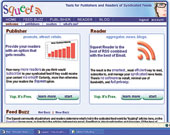 |
| A screenshot from www.squeet.com |
There are certain things you see everyday on every website but never really bothered to find out what they exactly are. If you did and used these tools, you would be surprised how simple your life on the Internet becomes.
Little orange buttons tucked into a web page unobtrusively proclaim “RSS 2.0”, “Atom” or “MY Yahoo”. These are all tools that enable you to get live feeds from websites of your choice directly into your computer. They take the latest headlines from sites and display them so that you can quickly scan them. If something interests you, just click on the link and you will be directed to the web page where you can read the news or article. So instead of going to 10 different websites for the latest gossip, photos, weather information or news and sports headlines, you see them all in one screen the way you choose to display them.
RSS stands for Really Simple Syndication or Real-time Simple Syndication. You would use RSS if you are in the habit of reading several blogs a day. You would want to know when these blogs are updated. Similarly, you would use RSS to check whether your favourite hobby sites, be it technology or motorcycles, have been updated.
So how do you get a list of news from different websites? For this you need news aggregators or RSS readers. The latest versions of Internet Explorer, Firefox and Opera all come with built-in RSS readers.
In Internet Explorer 7, you will find a small button on the toolbar to your right. Whenever the browser detects RSS feeds, it turns orange and clicking on it will let you subscribe to that feed. To read all your feeds, just press Control-Alt-Shift-J together.
Firefox handles feeds with a feature called Live Bookmarks. When you encounter an RSS button on a website of your choice, click on it. You will then be given an option to subscribe to this feed. In this way, your live bookmarks on Firefox will constantly show you updated news items from websites you choose.
Opera, like Internet Explorer 7, recognises correctly coded RSS or Atom feeds on web pages. The browser will then display a small icon within the address field. Click on the icon to subscribe to the newsfeed. The first time you subscribe to a newsfeed, “Feeds” will be added to Opera’s main menu, from which you can read and manage your feeds.
If you do not use one of the latest browsers, get hold of a popular RSS reader like FeedDemon (www.bradsoft.com) or Squeet (www.squeet.com). If you prefer web-based readers, my favourite is Google Reader (www.google.com/reader) and Bloglines (www.bloglines.com).
On many sites, you will find a line saying “subscribe to this Atom feed”. Atom is another syndication format like RSS. Most RSS readers support both RSS and Atom.
Over time, your browser’s Bookmarks or Favourites can get really crowded. To help you over come this annoyance, you should join a social bookmark site. Among the most popular are Digg, del.icio.us, Newsvine and NowPublic. Under every story on many websites, you will find a line saying “Digg it” or something like “post this story” to del.icio.us, Newsvine or NowPublic.
Social bookmarking sites like these allow users to post their favourite sites or links to stories, using tags (or key words) to categorise and organise them. Other users can then take these bookmarks and add them to their own collection or share them with more users.
Among the best is del.icio.us. The primary use of del.icio.us is to store your bookmarks online, which allows you to access the same bookmarks from any computer as well as add bookmarks from anywhere. On del.icio.us, you can use tags to organise and remember your bookmarks, which is a much more flexible system than folders.
Many find Digg (www.digg.com) to be a goldmine of great stories and hard-to-find tutorial and tips. You can tell how popular a story is by seeing the number of users who have “Digg”-ed them. At Newsvine and NowPublic, you can find stories from the big media as well as from individual contributors. The community decides which story is placed where depending on the importance readers give it.
Send in your computer related problems to askdoss@abpmail.com.










